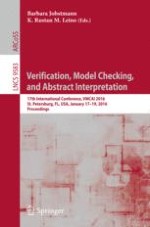2016 | OriginalPaper | Buchkapitel
\(D^3\): Data-Driven Disjunctive Abstraction
verfasst von : Hila Peleg, Sharon Shoham, Eran Yahav
Erschienen in: Verification, Model Checking, and Abstract Interpretation
Verlag: Springer Berlin Heidelberg
Aktivieren Sie unsere intelligente Suche, um passende Fachinhalte oder Patente zu finden.
Wählen Sie Textabschnitte aus um mit Künstlicher Intelligenz passenden Patente zu finden. powered by
Markieren Sie Textabschnitte, um KI-gestützt weitere passende Inhalte zu finden. powered by
